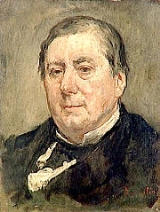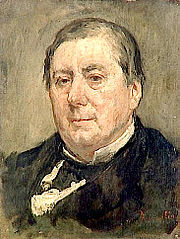
Eugène Marin Labiche
Encyclopedia

Eugène Marin Labiche was a French
France
The French Republic , The French Republic , The French Republic , (commonly known as France , is a unitary semi-presidential republic in Western Europe with several overseas territories and islands located on other continents and in the Indian, Pacific, and Atlantic oceans. Metropolitan France...
dramatist.
Biography
He was born into a bourgeois family and studied lawLaw
Law is a system of rules and guidelines which are enforced through social institutions to govern behavior, wherever possible. It shapes politics, economics and society in numerous ways and serves as a social mediator of relations between people. Contract law regulates everything from buying a bus...
. At the age of twenty, he contributed a short story to Chérubin magazine, entitled Les plus belles sont les plus fausses. A few others followed , but failed to catch the attention of the public. He tried his hand at dramatic criticism in the Revue des théâtres and in 1838, wrote and premiered two plays.
The small Théâtre du Pantheon produced, to some popular success, his drama L'Avocat Loubet, while a vaudeville
Vaudeville
Vaudeville was a theatrical genre of variety entertainment in the United States and Canada from the early 1880s until the early 1930s. Each performance was made up of a series of separate, unrelated acts grouped together on a common bill...
, Monsieur de Coyllin ou l'homme infiniment poli (written in collaboration with Marc Michel and performed at the Palais Royal) introduced a provincial actor who was to become and to remain a great Parisian favourite, Grassot, the famous comedian.
In the same year Labiche, still doubtful about his true vocation, published a romance called La Clé des champs. According to Leon Halévy
Léon Halévy
Léon Halévy , was a French civil servant, historian, and dramatist.Born to a Jewish family, the son of the writer and chazzan Élie Halévy, Léon was the younger brother of the composer Jacques François Fromenthal Halévy.After finishing a course at the Lycée Charlemagne, Halévy became a disciple and...
, Labiche's publisher went bankrupt soon after the novel was out: "A lucky misadventure, for this timely warning of Destiny sent him back to the stage, where a career of success was awaiting him." There was yet another obstacle in the way. When he married, Labiche solemnly promised his wife's parents that he would renounce a profession then considered incompatible with moral regularity and domestic happiness. A year later, his wife released him from his vow, and Labiche recalled the incident when he dedicated the first edition of his complete works to her.
In conjunction with Varin, Marc Michel, Louis François Clairville, Philippe François Dumanoir, and others, he contributed comic plays interspersed with couplets to various Paris theatres. He was considered a successful but undistinguished vaudevillist until the success of his five-act farce
Farce
In theatre, a farce is a comedy which aims at entertaining the audience by means of unlikely, extravagant, and improbable situations, disguise and mistaken identity, verbal humour of varying degrees of sophistication, which may include word play, and a fast-paced plot whose speed usually increases,...
, Un Chapeau de paille d'Italie (The Italian Straw Hat) in August 1851. It is an accomplished specimen of the French imbroglio-style play, in which someone is in search of something, but does not find it till five minutes before the curtain falls. For the next twenty-five years, he continued to write successful comedies and vaudevilles, all basically constructed on the same plan and containing a dose of comic observation and good sense.
"Of all the subjects," he said, "which offered themselves to me, I have selected the bourgeois. Essentially mediocre in his vices and in his virtues, he stands half-way between the hero and the scoundrel, between the saint and the profligate."
During the second period of his career Labiche collaborated with Alfred Delacour, Adolphe Choler, and others. Emile Augier said: "The distinctive qualities which secured a lasting vogue for the plays of Labiche are to be found in all the comedies written by him with different collaborators, and are conspicuously absent from those which they wrote without him.” Even more important was his professional relationship with actor Jean Marie Michel Geoffroy, who specialized in Labiche's pompous and fussy bourgeois characters. Many of Labiche's roles were written specifically for Geoffroy. Célimare le bien-aimé (1863), Le Voyage de M. Perrichon (1860), La Grammaire, Un Pied dans le crime, La Cagnotte (1864), were some of Labiche's most important plays.
In 1877 he ended his connection with the stage, and retired to his rural property in Sologne. There he devoted his energies to supervising agricultural work and to reclaiming land and marshes. His lifelong friend, Émile Augier
Émile Augier
Guillaume Victor Émile Augier was a French dramatist. He was the thirteenth member to occupy seat 1 of the Académie française on 31 March 1857.-Biography:...
, visited him there, and strongly advised Labiche to publish a collected and revised edition of his works. Though Labiche was initially reluctant, he issued his comic plays in ten volumes during 1878 and 1879, which were enthusiastically received. Many people had assumed that Labiche's plays owed their popularity to the actors who had appeared in them, but upon reading the plays, they realized that their success was due to the writing itself, with its humor and skilled characterization. Due to this reevaluation of Labiche's writing, he was elected to the Académie française
Académie française
L'Académie française , also called the French Academy, is the pre-eminent French learned body on matters pertaining to the French language. The Académie was officially established in 1635 by Cardinal Richelieu, the chief minister to King Louis XIII. Suppressed in 1793 during the French Revolution,...
in 1880.
Labiche died in Paris and was buried in the Cimetière de Montmartre.
Some admirers have considered Labiche the equal of Molière
Molière
Jean-Baptiste Poquelin, known by his stage name Molière, was a French playwright and actor who is considered to be one of the greatest masters of comedy in Western literature...
; his plays are more complex and less coarse than many other examples of French farce. Love is practically absent from his theatre. In none of his plays did he ever venture into the depths of feminine psychology, and womankind is only represented by pretentious old maids and silly young ladies. He ridiculed marriage, but in a friendly and good-natured manner which always left a door open to repentance and timely amendment.
External links
- Eugène Labiche at OpenLibrary
- http://www.ibdb.com/person.php?id=11050 4 plays on Broadway from 1905 to 1936

